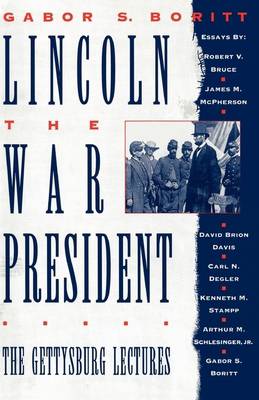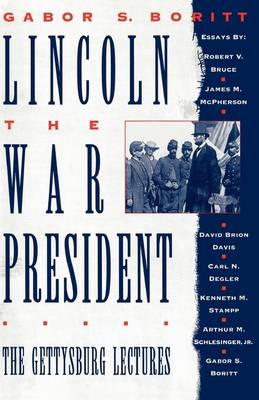
Je cadeautjes zeker op tijd in huis hebben voor de feestdagen? Kom langs in onze winkels en vind het perfecte geschenk!
- Afhalen na 1 uur in een winkel met voorraad
- Gratis thuislevering in België vanaf € 30
- Ruim aanbod met 7 miljoen producten
Je cadeautjes zeker op tijd in huis hebben voor de feestdagen? Kom langs in onze winkels en vind het perfecte geschenk!
- Afhalen na 1 uur in een winkel met voorraad
- Gratis thuislevering in België vanaf € 30
- Ruim aanbod met 7 miljoen producten
Zoeken
Lincoln, the War President
The Gettysburg Lectures
€ 59,95
+ 119 punten
Omschrijving
"Americans interested in history need to make the pilgrimage to Gettysburg," writes Gabor Boritt in the Acknowledgments. In this book seven historians make that journey, five of them Pulitzer laureates, looking for Lincoln. Kenneth Stampp explores the issue of national self-determination, comparing the South's struggle for independence to others in history (including the post-Soviets in eastern Europe). Arthur Schlessinger, Jr. offers a provocative comparison of how Lincoln and our other outstanding war president, FDR, went beyond the limits of the Constitution--and why. David Brion Davis focuses on the moment of emancipation. Boritt traces Lincoln's transition from a strident war opponent as a young man to resolute war leader as president. Carl Degler compares the American attempt at national unification with the unifications of Italy, Germany, and other nations. Robert Bruce contrasts premonitions of civil war with Lincoln's reluctance to accept war as a possibility. And James McPherson establishes once and for all the war president's brilliance as a national strategist. These outstanding essays--all but one published here for the first time--offer a new understanding of a revolutionary epoch in American history, and of the role of the leader who helped transform the nation forever.
Specificaties
Betrokkenen
- Uitgeverij:
Inhoud
- Aantal bladzijden:
- 272
- Taal:
- Engels
- Reeks:
Eigenschappen
- Productcode (EAN):
- 9780195089110
- Verschijningsdatum:
- 19/05/1994
- Uitvoering:
- Paperback
- Formaat:
- Trade paperback (VS)
- Afmetingen:
- 140 mm x 210 mm
- Gewicht:
- 331 g

Alleen bij Standaard Boekhandel
+ 119 punten op je klantenkaart van Standaard Boekhandel
Beoordelingen
We publiceren alleen reviews die voldoen aan de voorwaarden voor reviews. Bekijk onze voorwaarden voor reviews.








